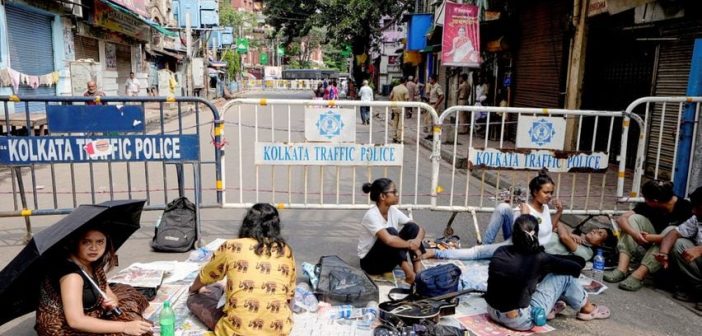The RG Kar Medical College and Hospital rape case in Kolkata has exposed alarming shortcomings in India’s judicial and political systems when it comes to addressing sexual violence. The delays in delivering justice to the survivor, compounded by administrative inertia and political entanglements, have not only prolonged the victim’s trauma but also raised broader concerns about the efficacy of India’s anti-rape laws. This case underscores the systemic challenges that continue to impede the protection of women in the country, casting a shadow over the legal frameworks meant to ensure their safety.
The RG Kar Rape Case: A Timeline of Events and Delays
The incident at RG Kar Medical College occurred in October 2022, when a female medical student was allegedly raped by a fellow student in the college premises. The case, which shook the academic community, initially seemed to have sparked a swift response from both law enforcement and the college administration. The accused was arrested and a First Information Report (FIR) was filed, bringing some hope that justice would be delivered promptly.
However, as the months passed, the case fell into a series of procedural delays that are all too familiar in India’s overburdened judicial system. Pre-trial investigations dragged on as medical reports were contested, and hearings were repeatedly postponed due to administrative lapses and adjournments by both the prosecution and defense. Nearly two years after the incident, the trial is still in its preliminary stages, and the survivor has yet to see justice served.
Legal and Judicial Failures: Delayed Justice and its Consequences
The delays in this case highlight critical flaws in India’s judicial system, where over 31 million cases remain pending, many for years or even decades. Cases involving sexual violence are particularly prone to delays, despite the Criminal Law (Amendment) Act of 2013, which mandates fast-track trials for rape cases. The RG Kar case should have been concluded within months, yet it continues to languish in the courts, reflecting the gap between legal mandates and their implementation.
Data from the National Crime Records Bureau (NCRB) reveals that the conviction rate for rape cases in India remains dismally low. In 2022, the conviction rate for rape stood at just 26.6%, a figure that highlights the challenges survivors face in navigating the legal system. Delays in cases like RG Kar not only weaken the prosecution’s case, as evidence becomes harder to verify over time, but also deter other survivors of sexual violence from coming forward due to the perceived inefficacy of the system.
Undermining Women’s Safety and Confidence in the Legal System
The prolonged delay in justice for the RG Kar rape survivor is not just a legal failure—it also undermines women’s safety in a broader societal context. When high-profile rape cases remain unresolved, it sends a damaging message to society that perpetrators can escape justice by exploiting the legal system’s inefficiencies. This erodes public trust in the institutions that are meant to protect women and enforce accountability.
The emotional toll on survivors is profound, as they are forced to relive their trauma over the course of drawn-out legal proceedings. For the victim in the RG Kar case, the lack of closure has likely exacerbated her trauma, which is further compounded by the stigma associated with sexual violence in Indian society. Delays in justice serve to isolate survivors, leaving them vulnerable to further victimization, harassment, or intimidation, often from the accused or their supporters.
The Political Quagmire: Local and National Implications
The political dimensions of the RG Kar case cannot be ignored. In West Bengal, where the case unfolded, issues related to women’s safety have been deeply politicized, with opposition parties frequently criticizing the state government for failing to protect women. The ruling Trinamool Congress (TMC) has come under fire for its handling of crimes against women, with several high-profile cases over the past few years stirring widespread protests.
The RG Kar case has also become a flashpoint for political debates about law and order, particularly as West Bengal prepares for upcoming elections. Both national and regional parties have sought to leverage the case for electoral gains, further complicating the situation. While opposition parties accuse the ruling TMC of mishandling the case, the state government has attempted to shift blame to systemic issues in the judiciary. Meanwhile, the survivor continues to be caught in this political crossfire, her demand for justice overshadowed by electoral calculations.
Broader Implications: A Call for Reform
The RG Kar rape case exemplifies how delays in justice undermine the objectives of India’s anti-rape laws and women’s safety measures. While the introduction of the Nirbhaya Act and the fast-track courts in 2013 was seen as a major step forward, the implementation of these reforms has been patchy at best. Cases like RG Kar continue to highlight the gaps between legislative intent and real-world outcomes.
To ensure timely justice in cases of sexual violence, a multipronged approach is required:
- Judicial Reforms: The courts must prioritize cases of sexual violence, ensuring that mandated fast-track trials are not delayed. Additional resources, including more judges and specialized courts, must be allocated to handle these cases.
- Improved Investigation Protocols: The initial investigation phase often contributes to delays in trial proceedings. Law enforcement agencies must be trained and equipped to conduct thorough and timely investigations to avoid procedural delays during the trial.
- Political Accountability: Political parties should refrain from using cases of sexual violence as electoral tools and instead work collaboratively to strengthen the legal and judicial systems. Women’s safety should transcend political rivalries, with both state and central governments committing to comprehensive reforms.
Conclusion: Justice Delayed is Justice Denied
The RG Kar rape case is a sobering reminder of the broader failures within India’s justice system when it comes to addressing crimes against women. The prolonged delays in delivering justice not only deepen the survivor’s trauma but also undermine the very purpose of the country’s anti-rape laws. Without urgent reforms and a political will to prioritize women’s safety, India risks failing the very people these laws were designed to protect. As the case continues to drag on, it stands as a grim symbol of the hurdles faced by countless survivors seeking justice in India.






